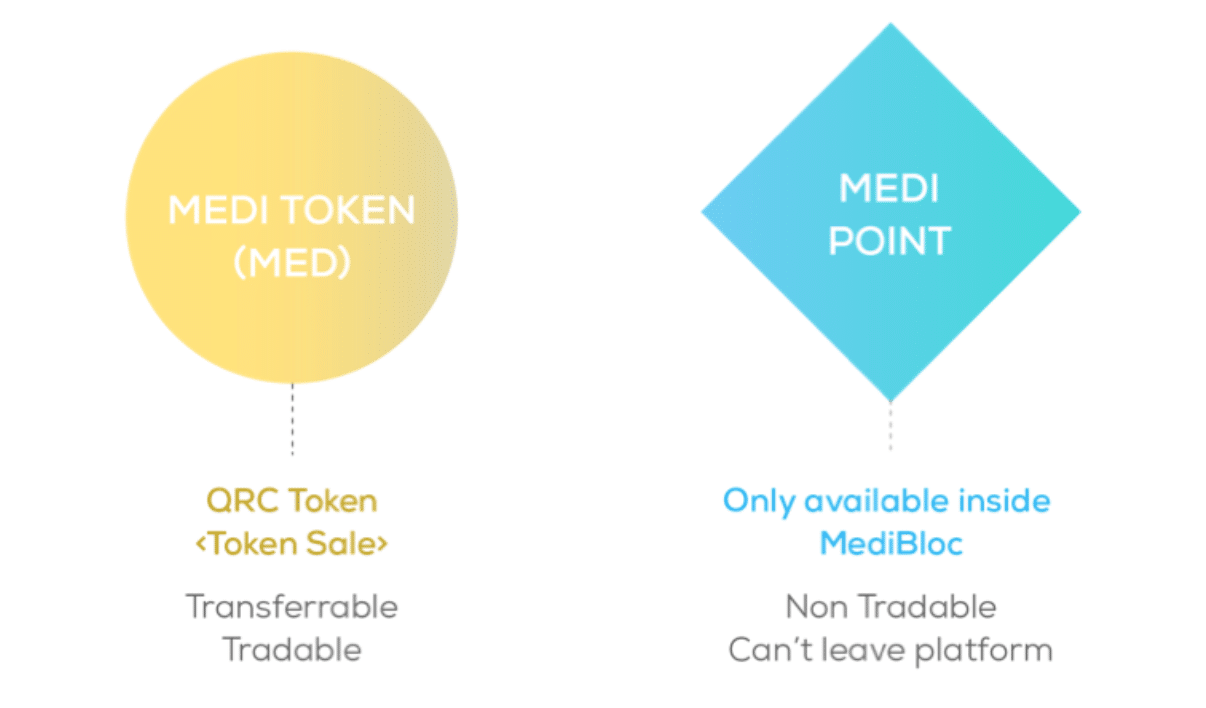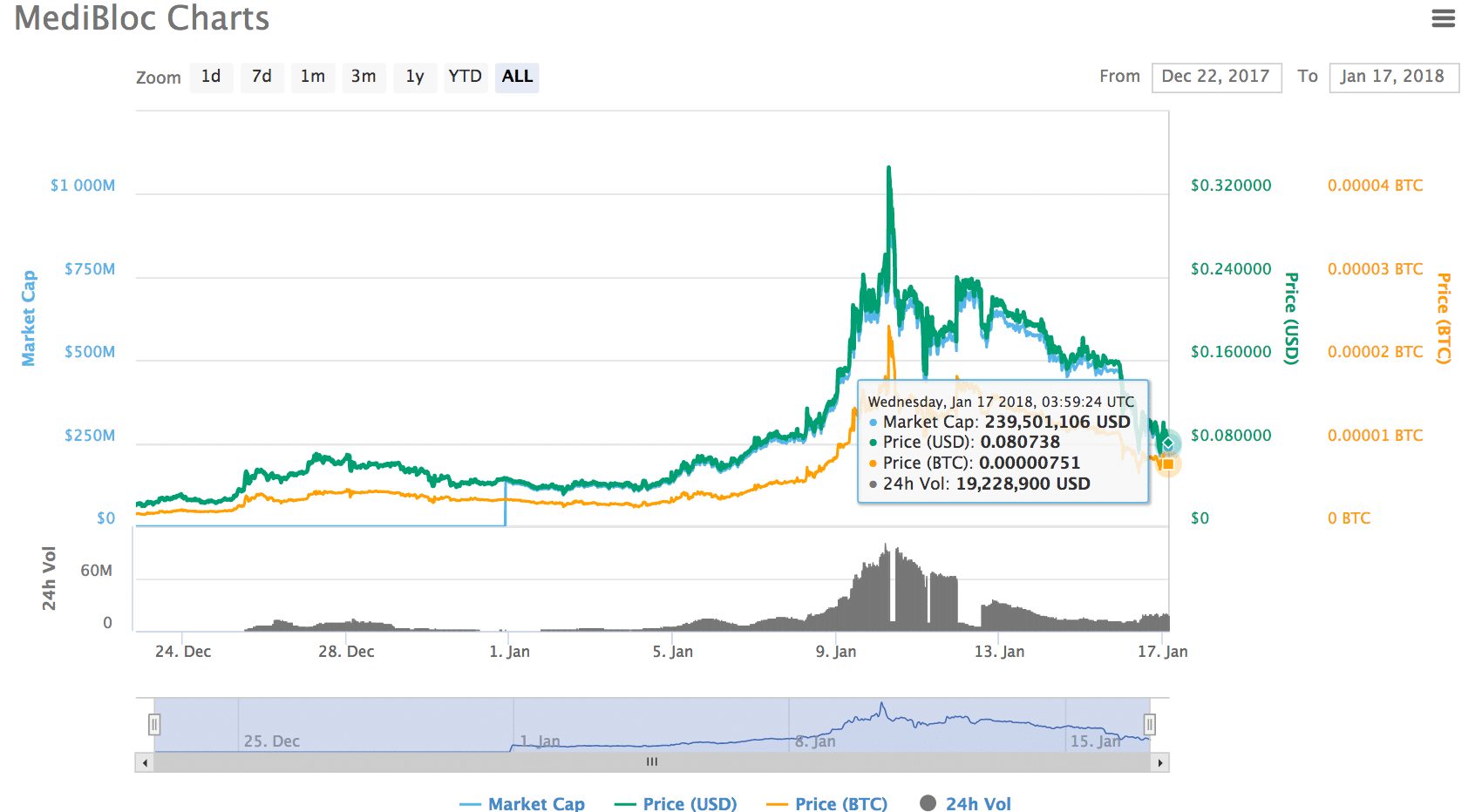What is MediBloc? A Beginner’s Guide
Do you get tired of writing your medical history down over and over again, or taking the same medical exams every time you go to a new doctor? Dreaded experiences like these highlight some of the problems that face the healthcare industry. Unfortunately, real solutions are few and far in between.
One key issue is laws, such as the Health Insurance Portability and Accountability Act (HIPAA), that enable the centralization of health records and prohibit the sharing of said data. Without having a clear knowledge of a patient’s health status due to often limited access to their private records, those assisting patients (e.g., doctors, emergency medical service workers, researchers) are unable to provide top-notch care. This is where MediBloc comes in. The team behind the project guarantees that the platform is fully compliant with HIPAA.
MediBloc follows an open-source protocol and defines itself as a “decentralized healthcare information ecosystem built on blockchain technology for patients, healthcare providers, and researchers.” Its blockchain platform allows it to track and record everything revolving around your healthcare world such as doctors visits and record updates. By accumulating all of a patient’s medical history into a single, concise format, reliable, expedited patient care can take place, and individuals can be put in charge of dispersing their own records.
Moreover, its native currency MediBloc (MED) will facilitate the content sharing of records through a rewards system. Both patients and providers will be compensated for their contributions into the ecosystem, and patients will be able to use the tokens to initiate routine medical transactions (e.g pharmaceutical & insurance payments) with those partnered with Medibloc.
Key Features of MediBloc
The main goal of MediBloc is to make healthcare data more accessible while stimulating the contents of medical information for the purpose of scientific advancement. Some key features include:
- Redistribution of data ownership: MediBloc will put health record data back into patients’ hands and allow owners of data to decide who is allowed to view the documents.
- Data loss/fraud prevention: Data is backed up and only reliable healthcare affiliates will have access to edit data. Since modifications of data are transparent to all users on the blockchain, unethical adjustments are highly unlikely.
- The ERC20 MED token reward system: This encourages data owners to contribute to the data ecosystem through profit empowerment.
- Worldwide data interoperability: Global exchange of real-time information among the medical community will stimulate medical advancement and reduce unnecessary data repetition. Medical staff won’t have to wait for updated information, which will ultimately give you streamlined care with a greater chance of correct diagnosis.
- Security: The blockchain protocol being utilized offers increased safety measures to ward off data hacks.
Considering the subject of security, people often don’t realize how vulnerable the current system is to outside hacks (which are currently on the rise). As stated in Chicagobusiness.com, “by 2024, everyone in the U.S. will have had their healthcare data compromised if online theft keeps accelerating at the current pace”. Breaches like this are devastatingly costly to the medical industry. In the U.S. alone, healthcare breaches amass roughly $6 billion a year in losses.
How Does MediBloc Work?
The platform is a decentralized app (DApp) formulated on the Ethereum Virtual Machine (EVM). As seen in the image below, three layers create the overall structure of the platform: Core, Service, and Application. In the three layers, the information that will be held pertains to personal information, medical data, and MED account (users, providers, researchers) balance.
- MediBloc Core: Since blockchain storage is limited, the Core layer supplies extra storage to counter healthcare data loss.
- MediBloc Service: Using Smart Contract technology, this layer connects the Apps layer with the Core layer and allows for “data input/output through connection with the Core layer”.
- MediBloc Application: This layer enables people to use various applications (e.g. mobile applications) to access and manage the information.

The platform will use the Medi Point system (MP), a points-based system that measures user participation. To gain higher MP, one can purchase it with MED or contribute to the data network. After collecting MP’s and waiting three months, you can convert your MP to MED. As stated before, the MED token can be used in medical transactions such as insurance payments. Unlike MED tokens, MP’s are used in the verification process and will not leave the platform.
For more information regarding the technology behind MediBloc, refer to the project’s whitepaper.
About MediBloc
MediBloc’s mission statement says it will “improve healthcare access and experience by redistributing value of personal healthcare data, accelerating the world’s shift to private information decentralization.” Founded in Seoul, South Korea in 2017 by a team of medical doctors and developers, it’s a privately held company that currently lists 10 team members and 10 advisers on its official page.
Co-Founders Dr. Allen Wookyun Kho (former lead software engineer at Samsung) and Dr. Eunsol Lee bring years of medical and technical expertise to the company by simultaneously being certified medical doctors and software engineers. To keep yourself informed of the project updates, you can follow the team’s official GitHub.

MediBloc Coin Supply
MediBloc distributed 20% of its tokens to the founding team, 10% to advisors/ early investors, 12% towards business development, 8% towards research, and 50% to participants of the “token generation event” (token sale).

During the crowd sale, MediBloc announced the issuance of 10 Billion MED, with any tokens that remained after the sale to be burned. Currently, MediBloc has a total token supply of roughly 4 billion MED, with 2,966,384,100 MED (the total amount of MED sold) in circulation. Explained in MediBloc’s blog post, the rationale for burning remaining coins was for two reasons:
“1. MediBloc team only wants to hold the necessary amount of tokens that will enable the team to proceed to the next step and be responsible and liable for MediBloc community and ecosystem.
2. MediBloc team wants to protect the token value and act in the best interest of the token sale participants.”
MediBloc Trading History
According to CoinMarketCap, MED began trading on December 22, 2017 for around $.02, reaching ATH’s of nearly $.35 on January 10th, 2018. At the time of writing, the price of MED is hovering around $0.08, a steep decline that goes along with the present bearish trend of the overall cryptocurrency market.
As the MediBloc platform grows its user base, the value of MED should rise leading to an increase in price. As with all cryptocurrencies, though, other factors, such as the overall trend of the market, could hinder this growth.

Where Can You Buy MediBloc?
Only two exchanges currently support the trading of MediBloc – Coinrail and Gate.io. New users can purchase BTC or ETH coins on sites that allow for credit card purchases such as Bitstamp or Coinbase, and then deposit it to their respective wallets on Coinrail or Gate.io.
Where Can you Store MediBloc?
If you prefer not to store your MED tokens on exchange wallets, the team at MediBloc offers a step by step guide on how to store your tokens on the Qtum Core Wallet. As of now, this is the only available method for storing MediBloc coins until new wallets are supported.
Conclusion
According to MediBloc advisor Sang Min Park (who is also the head professor of the Department of Family Medicine at Seoul National University), “we are at a point in time when privacy must be guaranteed and patients must have the right and the resources to make autonomous decisions. MediBloc’s innovative solution will lead new changes to the medical ecosystem in this regard.”
MediBloc seems to have a solid team behind it and an interest in protecting its stakeholders through their plausible explanation of the coin burn. With the founders having experience in both the medical field and the technical field, it’s not hard to imagine that they know first-hand the problems facing the healthcare industry and have creative ways to solve them through technical advancement.
If the project carries out what it intends to, it could be revolutionary in the healthcare realm. Not only could it save patients and medical professionals a great deal of time and hassle, it could potentially aid in the advancement of medicine through decentralizing access to critical data around the world. So, while the project is still in its infancy and has a long road ahead of it, the plausible use cases for the MediBloc platform/currency are hard to ignore.
The post What is MediBloc? A Beginner’s Guide appeared first on CoinCentral.

TheBitcoinNews.com – Bitcoin News source since June 2011 –
Virtual currency is not legal tender, is not backed by the government, and accounts and value balances are not subject to consumer protections. TheBitcoinNews.com holds several Cryptocurrencies, and this information does NOT constitute investment advice or an offer to invest.
Everything on this website can be seen as Advertisment and most comes from Press Releases, TheBitcoinNews.com is is not responsible for any of the content of or from external sites and feeds. Sponsored posts are always flagged as this, guest posts, guest articles and PRs are most time but NOT always flagged as this. Expert opinions and Price predictions are not supported by us and comes up from 3th part websites.
Advertise with us : Advertise
Our Social Networks: Facebook Instagram Pinterest Reddit Telegram Twitter Youtube










